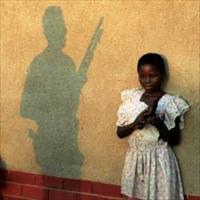KENYA: Reconciliation key to returns

Peace-building and reconciliation efforts to alleviate ethnic tension must be stepped up before internally displaced Kenyans are pushed to return to their homes or the risk of further violence will remain high, according to the UN and agencies.
"Ethnic tension remains high - hate, resentment and mistrust are widespread and people have few avenues to vent their feelings," Bernard Leflaive, early recovery and food security cluster coordinator and consultant to the UN Development Programme (UNDP), told IRIN. "The big precondition for return must be that people are able to live in security wherever they choose to go, and they should be able to form normal relationships with their neighbours."
The early recovery and food security cluster - comprising UN bodies, NGOs and government departments - aims to assist the government to ensure that communities affected by Kenya's post-election violence return to a state of normalcy as early as possible. The cluster deals with, among other issues, peace and reconciliation, governance and rule of law and the restoration of livelihoods.
"The assessment found that returns are being delayed because of the tension," said Daudi Ekwam, an early recovery needs assessment consultant for UNDP. "Return requires caution, and internally displaced people [IDPs] still have the same right as everyone else to choose whether to go back home or not."
He added that the goal of early recovery was to handle returns on a case-by-case basis and in an integrated and incremental way that would ensure the best chance of success.
Reconciliation bid
UNDP, in conjunction with local authorities and community service organisations, is involved in bringing communities together to encourage dialogue and reconciliation.
"We also have a volunteer scheme where members of various communities receive training and resources to carry out peace-building among their people," Leflaive said.
In the Rift Valley Province, host to the largest number of IDPs, efforts are under way to bring IDPs and their host communities to the table for reconciliatory discussions.
"We are in Kuresoi, joining hands with the government to bring IDPs from Molo town to meet the local Kalenjin community leaders," said Raphael Kinoti, regional coordinator of the National Council of Churches of Kenya. "Our aim is for the talks to result in the Kalenjin people inviting the Kikuyu people back to their farms.
"So far the process seems to be going well; the Kalenjin leaders have expressed remorse for the expulsion of the Kikuyu and they want everyone to get back to their farms," he added.
However, Kinoti stressed that the returns would hinge on the government's ability to provide additional security to the IDPs upon their return in the event that violence should flare up again.
The government will have an uphill task dealing with these issues, particularly given that many of its officials were themselves displaced in the violence and others were unaware of how to deal with the situation.
"Governance and the rule of law were affected - government officials had their authority challenged by these armed gangs," Leflaive said. "But some officials have had fantastic peace-building initiatives; one district commissioner actually went to the mother of a trouble-causing MP and got her to bring him in line."
He added that it would be necessary to create and strengthen peace and development committees and disaster-management committees, both of which exist in some areas but are underdeveloped or non-existent in the worst-affected districts.
The recent formation of a government of national unity and the naming of a cabinet following several weeks of stalemate are likely to boost the process of recovery, according to community leaders in affected areas.
"Calmness and confidence are returning to this part of the country now," Bishop Jackson ole Sapit, who covers eight districts in Kenya's western Rift Valley Province, said from Kericho town. "Today, for instance, all the Kikuyu-owned shops in Kericho are open and business is proceeding as normal."
Restoring livelihoods
According to Leflaive, rebuilding livelihoods is another key element of early recovery, and while some people have been able to return to their former livelihoods, many more will need help.
"The local economy has suffered greatly and needs an injection of cash - microfinance projects, income-generating projects, support for agricultural and non-agricultural livelihoods; all this is necessary," he said.
The cluster's needs assessment found that in many areas, workers have lost their jobs or feel unwelcome at their places of work, while in other areas, businesses and farms were burnt down.
"Whatever efforts are undertaken to restore people's livelihoods, they must involve the youth, who played a big part in the conflict but who are largely unemployed and had nothing to lose," said Ekwam. "Women will also be central to the recovery of livelihoods - their resilience needs to be exploited if early recovery efforts are to succeed.
"The government should take the lead in restoring normalcy; positive developments such as the planned visits to affected communities by the president and prime minister should help inspire confidence in the current situation, which should in turn spur returns," he added.
While announcing the new coalition cabinet on 13 April, President Mwai Kibaki promised that his government would focus on the plight of IDPs. "The new cabinet will prioritise the resettlement of the displaced people so that they can resume normal lives," he said.
 Back and Next - Back and Next
Back and Next - Back and Next See Also - See Also
See Also - See Also